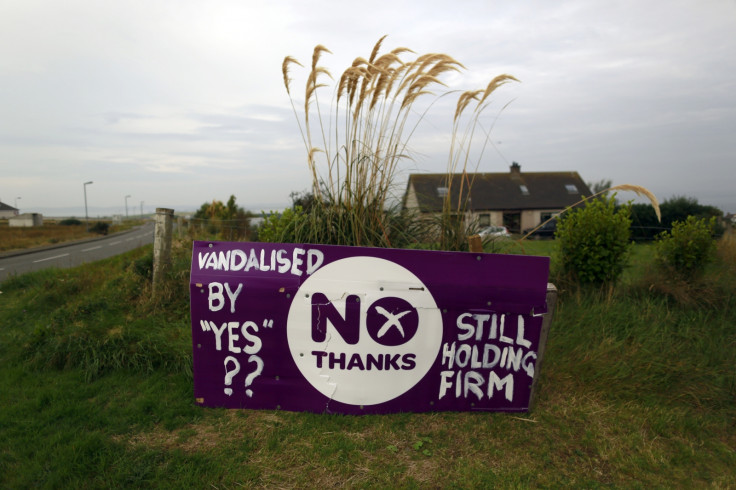Is Ukip a Threat to Scotland, or an Opportunity in Disguise?

A few weeks before the independence referendum, I found myself standing on a crowded Edinburgh bus, while sporting two distinctly noticeable "Yes" badges. I was with a friend from Hungary, who gave me a wicked smile and said that she'd like to take me back to meet her flatmate (also Hungarian) to see how he'd react to my badges. I assumed that he must be a less-than-tolerant No voter, but not a bit of it. In fact, he was a Yes voter - because he thought independence would be a disaster and reckoned it would be funny to watch Scotland burn.
I have the distinct feeling that equivalent dark thoughts have been crossing the minds of one or two independence supporters since Ukip's breakthrough in the Clacton by-election. It's not so much the sense that it would be funny to watch the UK "burn" under a Tory/Ukip coalition, but more that it would be a rather fitting irony after the campaign of terror that the London establishment subjected Scotland to a few weeks ago. Practically every scare story they dreamed up would come back to haunt them after Nigel Farage becomes Deputy Prime Minister.
We were told that an independent Scotland within the EU would somehow be an economic basketcase. But who can seriously doubt that an "independent" UK outside both the EU and the EEA (as Farage proposes) would suffer economic ruination? We were told that an independent Scotland would lose influence in the world. But how much influence will the UK have once it isolates itself from all of its neighbours, leaving the Franco-German axis as the only show in town when the US wants to talk to Europe about something? We were told that an independent Scotland would be an international pariah if it "defaulted" on its (non-existent) debt. But just how much respect will Britain command around the world if it becomes the only European country other than autocratic Belarus that doesn't accept the jurisdiction of the European Court of Human Rights?
So there is no shortage of opportunities for Schadenfreude if we want to wallow in it. The snag is that, as things stand, Scotland is still subject to London rule, and will burn in a Ukip Britain alongside everyone else. Or will it? There's also a more constructive reason why independence supporters are taking a keen interest in Farage's fortunes.
If Britain votes to leave the EU in the in/out referendum planned for 2017 (which Farage wants to bring forward to next July!), and if Scotland votes to stay in, we'll find ourselves in the one scenario which would bring the prospect of full independence back with a vengeance within a very short timescale. Given that so much of the No campaign's pitch was based on the supposed "risk" of Scotland finding itself outside the EU, it would be impossible to credibly argue that circumstances had not fundamentally changed.
I have little doubt that the SNP would push for a swift independence mandate. However, it's a mistake to think that it would all be plain sailing. There would be new-found advantages, certainly - for example, liberal-minded newspapers that backed a No vote last month on the fuzzy, happy-clappy grounds of "togetherness" would be forced to confront the reality of independence being the only way to avert Scotland's international isolation.

Labour and Liberal Democrat politicians would be faced with the same dilemma. Doubtless many of them would apply the same doublethink that they already use for Trident, and would convince themselves that they are somehow furthering the pro-European cause by keeping Scotland in a country that has turned its back on Europe for good. I suspect, though, that there would be at least some who would feel too much pressure on their consciences, and would cross over to the pro-independence side.
There is no shortage of opportunities for Schadenfreude if we want to wallow in it.
But the SNP and their allies would also face completely new challenges in the event of a "Brexit", and I'm not sure that those have been fully thought through yet. The passport-free Common Travel Area that currently operates throughout the British Isles would be under severe threat, and although there is no reason in principle why a non-EU country shouldn't share a currency with a country that is seeking to re-enter the EU, it becomes a distinctly implausible case to make.
The SNP would probably have to be much blunter about the prospect of there being some disruption as a result of independence, but equally blunt about that being a price worth paying to prevent the much greater disruption caused by leaving the EU. How the public would react to that message is anyone's guess.
In a sense, history is repeating itself in an upside-down sort of way. Forty years ago, the SNP were an anti-Common Market party, and hoped to use Britain's first referendum on Europe to further the cause of independence by producing a No vote in Scotland at the same time as a Yes vote in the rest of the UK. The result shows that the strategy could easily have worked, because the Yes vote was a full 9% lower in Scotland.
But in the event, the pro-Europe campaign was so successful that it secured a modest majority north of the border. That perhaps illustrates the folly of putting too much faith in potential indirect routes to independence which might only have a 20% or 30% chance of succeeding, especially when the consequences of failure would be so calamitous for our country.
To my mind, all the SNP can do is honestly and sincerely fight to protect Scotland from the menace of Ukip. But if they fail, and the worst-case scenario unfolds in spite of their best efforts, then by all means they should be ready to take full advantage of any serendipitous opportunities that arise as a result.
James Kelly is author of the Scottish pro-independence blog, SCOT goes POP! Voted one of the UK's top political bloggers, you can hear more from James on Twitter:@JamesKelly
© Copyright IBTimes 2024. All rights reserved.






















